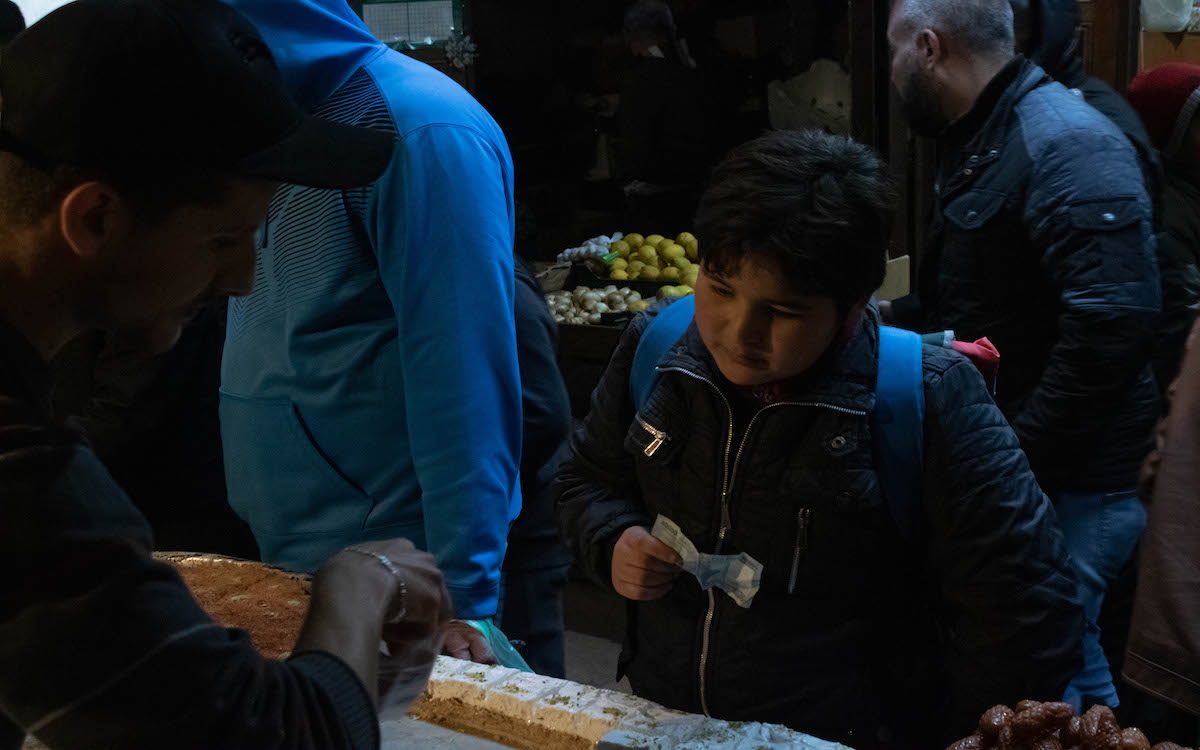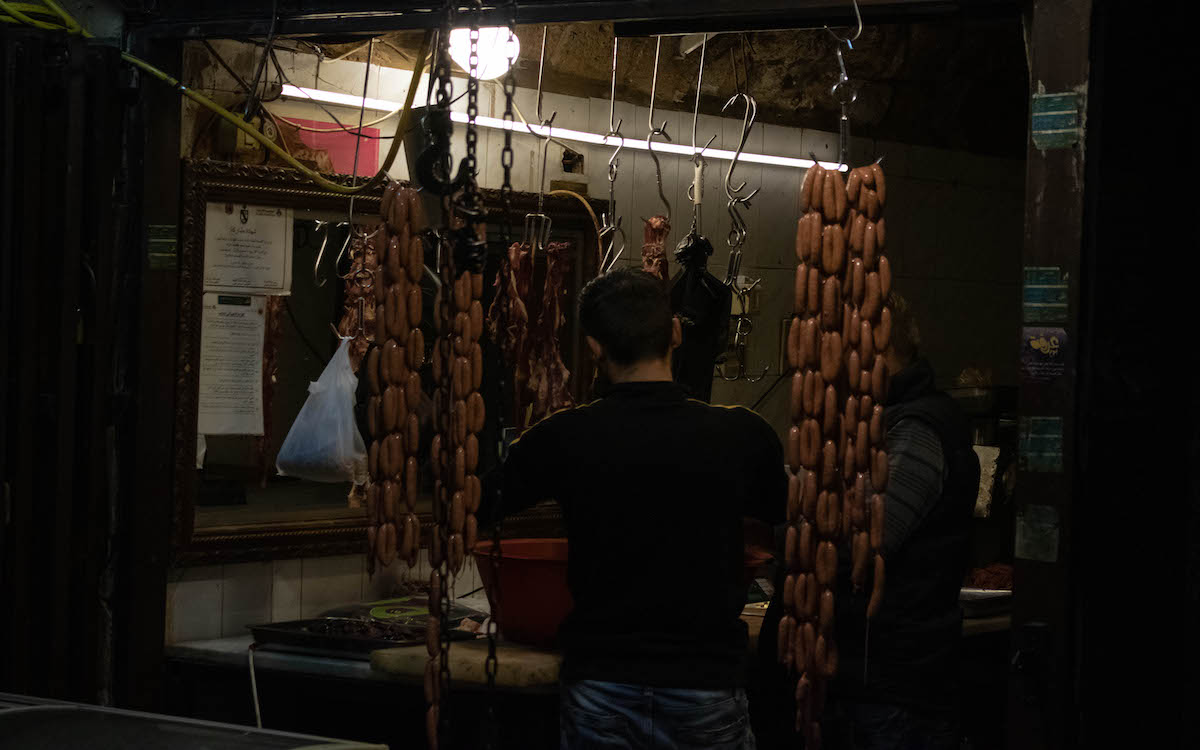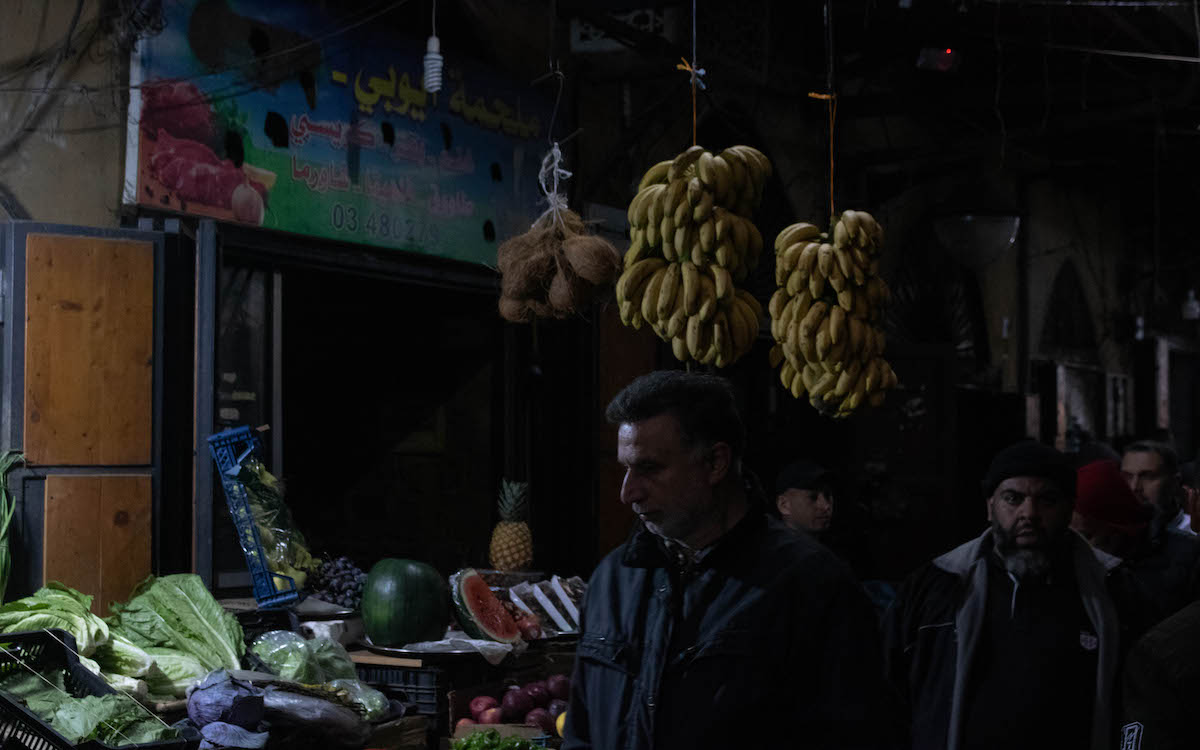
The tapping of rain on the informal roof made of metal sheets in souk al-khodrat, Arabic for vegetable market, could not be heard over the shouts coming from the dozens of vendors calling out to some of the passersby in the tiny, cramped street.
While the open-air souk may be called the “vegetable market,” it is a bit of a misnomer as everything from fruits and vegetables to meats and fish and sweets are also sold there, stacked high and wide on large wooden tables with so many options available it overwhelms the eye.
Men and women go from stall to stall, asking each of them what they are charging for a kilogram of potatoes or tomatoes while teenagers wave 50,000 lira notes at sweet shops to buy desserts for the family to enjoy later that night once they have broken their fasts.
Despite the wide variety of foods available and iftar, the time when Muslims break their Ramadan fast following sunset, being only hours away, there was little actual buying being done.
The market remains one of the cheapest places for Tripoli’s residents to buy food from, but even there, prices have become unaffordable to many Tripolitans, as the residents of Lebanon’s second largest city are referred to. The country’s economic crisis has gone into a tailspin since the start of the year, with the lira, Lebanon’s national currency, surpassing 100,000 to $1. The 100,000 lira note, the largest of Lebanon’s currency, was worth around $67 before the crisis started in October 2019.
Where many once bought kilograms of meat and vegetables that would feed a small family for a week, they now only buy small bags of vegetables and, if they can afford it, an even smaller bag of meat or chicken, but it is all too little to feed a family for just a few days.
“The situation as you can see, it’s horrible,” Mahmoud Nasrallah, 36, told NOW. “For example, you see a lady going to the souk carrying one million Lebanese Lira in her purse, given by her husband that went head over heels to earn this one million L.L, you see her buying groceries with this amount and leaving the market in tears because she just paid everything she has to get minimal stuff.”

A butcher in Tripoli’s market prepares meat on March 29, 2023. Meat has become a rarity in many households in Lebanon as the economic crisis has worsened. Photo: Nicholas Frakes, NOW
The worst Ramadan so far
Since the start of the crisis, Ramadan celebrations have become increasingly muted as purchasing power has depleted with the value of the lira and climbing inflation.
In a March 23 statement, the International Monetary Fund warned that Lebanon’s triple-digit inflation will continue to spiral in a never-ending cycle unless serious reforms are implemented, something that the country’s politicians have refused to do even as the crisis is well into its fourth year.
There is also little work available that pays a living wage.
Some are having to work multiple jobs just to cover basic expenses and take care of their families, others pull their children out of school so that they can add another breadwinner to the family. But with the worsening value of the lira and the rising prices, this is also becoming insufficient.
This is felt especially hard in Tripoli which, despite its stature as Lebanon’s “capital in the north,” is arguably also the country’s most neglected and impoverished city.
Even in once traditionally cheaper areas, such as the souk, buying large quantities of food is no longer an option; instead, people have to calculate how much they can buy to at least have some food in their stomachs as well as how much they can save for later in the month as prices could rise even further with the volatile lira rate seemingly rising and lowering at a whim.
In past years, if people needed something cheap to eat, they would cook potatoes, but with the price of oil reaching once unimaginable heights, even this can prove to be too much at times.
Ramadan is about being with the family and being closer to God. It is so nice to sit with the family after a long day of fasting at the dining table full of food that we crave, but, unfortunately, this is not the case anymore.
Meat, which can cost hundreds of thousands of lira, is not even an option for most.
“We are craving meat; it’s been ages since we had meat,” Nasrallah stated. “Even when we want to eat fries, we need to buy the potatoes and get oil to fry them, this alone costs more than 500,000 LL.”
During Ramadan, Muslims fast from sunrise to sunset, with many families in the past breaking their fasts with large meals, dishes containing a plethora of vegetables, meats, grains and spices.
This is no longer the case, with meals now being much simpler and smaller with the most vulnerable managing what could only be charitably described as a meal.
“Ramadan is about being with the family and being closer to God. It is so nice to sit with the family after a long day of fasting at the dining table full of food that we crave, but, unfortunately, this is not the case anymore,” Nasrallah explained.
“I have seen people break their fast on a plate of fries, and dates. Nothing more. A whole family breaking their fast on this. These people are good people, they do not steal, or kill, etc. They are just good people who are praying for a better living.”
According to Nasrallah, a growing number of people are taking the slowly rotting fruits and vegetables that they find on the street in order to avoid having to spend the extra money to get fresh produce.
It is a tragedy, he exclaimed, cursing the country’s politicians for putting them in this situation and for doing nothing to help them in their time of need.
Nasrallah is unable to hold a steady job due to a physical disability, making his situation even more difficult.
Married for seven years, he and his family live in the attic of his family home as they are unable to afford any other living situation.
“I cannot even buy my daughter a bag of chips,” he said solemnly.
Coffee shops, once crowded and bustling with life after families have had their iftar meals, are also a shadow of their former selves.
The Mousa Coffee Shop in the Bab al-Raml neighborhood of Tripoli has long been a local favorite during Ramadan with the square, usually empty, filled with tables and seats where friends and families would sit for several hours together ordering coffees and tea and taking long tokes from their hookahs while talking and laughing with each other into the early hours of the following morning.
Previously, the coffee shop was packed with people, making it almost impossible to find a place to sit, but this year, a handful of tables that people once competed over remind empty.
For others, though, Ramadan has presented a brief opportunity for improving their situation and a chance to breathe a sigh of relief, no matter how brief it might be.
“Ramadan this year is better for me personally,” Wasif Habbib, a 36-year-old baker, told NOW. “Last year, I needed to hand out the food that I could not sell in the day, but this year I am selling all the food that I am making.”

A man walks by a fruit and vegetable vendor in Tripoli’s market on March 29, 2023. Basic commodities, like fruits and vegetables, are becoming increasingly out of reach for people in Lebanon. Photo: Nicholas Frakes, NOW
A chance at life
Food undoubtedly plays a major role in Ramadan celebrations, with emphasis being put on family iftar meals where the gatherings traditionally see large table spreads of food.
Even with the ongoing economic crisis and the high prices, people continue to try to keep this tradition going to the best that they can.
One traditional staple are the tiny pastries that bakeries make that are covered in cheese, zaatar, small quantities of meat, or vegetables.
For Habbib, this means he is almost always able to sell his daily stock during the holy month rather than worrying whether or not it will go to waste.
After Ramadan, I do not know what to expect. I am living day by day. Maybe the dollar rate to Lebanese Lira would reach 150,00 LL. Who knows.
Just on the outskirts of souk al-khodrat, Habib stands behind a small table where he has his selection of pastries displayed on large metal trays for people to choose from.
He is constantly moving around, grabbing a small plastic bag and putting a handful of the pastries in them as customers continue to come in a steady flow.
The economic crisis has been hard on him. He works alongside two other people and most of the money that he makes goes towards buying supplies to bake more pastries, leaving him with only around 100,000 lira at the end of the day.
Flour costs around $32, he says, while cheese can vary in price with some going for around $6 to $60, demanding a significant portion of his daily earnings.
“Before I used to put more money from my profit to cover the debt, now I’m buying wares from my profit,” Habbib stated. “I am barely receiving anything at the end. I am barely making it.”
Prior to the start of Ramadan, he almost always had dozens of pastries left over at the end of the day and he had to practically beg people to take them for free so that they would not go to waste in the trash, a dramatic shift from just a few years ago when many bakeries could barely keep up with the daily demand and when children might buy a dozen of the same types of pastries that Habbib sells before they went to school in the morning.
While business might be good now, he knows that it will not be permanent and is likely only a temporary reprieve from the daily struggles and frustration that he faced just two months before.
“After Ramadan, I do not know what to expect. I am living day by day. Maybe the dollar rate to Lebanese Lira would reach 150,00 LL. Who knows,” the baker said, shrugging at the unknown and potentially bleak future that awaits him.
Many small shop owners are sympathetic to their customer’s situations and do not want to charge exorbitant prices for the goods that they sell, but they also need to make a living so that they can feed their own families.
With the dollar rate constantly fluctuating every day, Habbib says that business owners are struggling just like everyone else.
Prices differ from store to store, with Habbib charging around 80,000 lira for his pastries while other shops may charge well over 100,000. But no matter what they charge, it is still never enough to cover all of their expenses, as whatever prices they set in the morning are quickly made redundant by the shifting in the lira’s value.
“We are just working to eat and drink. Not more,” he said. “If we need any medical help or care, it will not be possible to afford. We will die.”
Ramadan still has over two weeks remaining, and with the economic crisis in full swing , Eid al-Fitr, which marks the end of Ramadan, is widely expected to be just as quiet as the month that preceded it, with families having little other choice but to celebrate over smaller, humbler meals as they reminisce about the celebrations that they once enjoyed.
Nicholas Frakes is a senior reporter with @NOW_leb. He tweets @nicfrakesjourno.
Rayanne Tawil contributed to this report.








